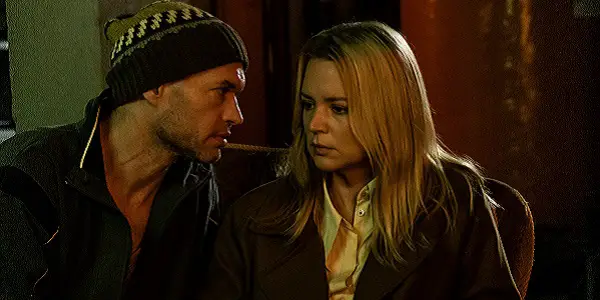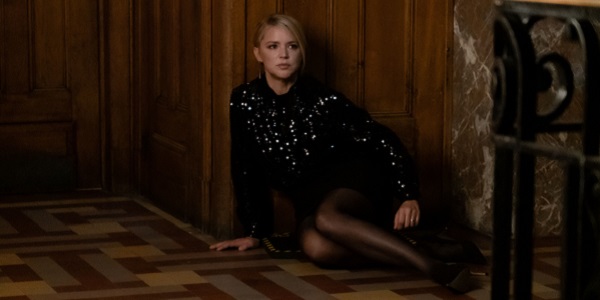MADELEINE COLLINS: Virginie Efira Does Vertigo

Lee Jutton has directed short films starring a killer toaster,…
Directed by Antoine Barraud (Portrait of the Artist, Rouge) from a script by Barraud and Héléna Klotz, Madeleine Collins opens with a stylish, suspenseful sequence set in the kind of luxurious clothing store that has more salespeople in crisp suits on display than actual items to purchase. As the camera follows a young blonde woman in one long, unbroken shot while she picks out dresses to try on, one wonders where this is all going; it’s equal parts mundane and mysterious, with the striking crimson decor of the shop helping to create an atmosphere of dread of that is almost Argento-esque. Suddenly, the blonde woman faints in the dressing room, hitting her head on the wall as she falls. Then there is blood and screams. One doesn’t understand the significance of this moment until much later in the film, but it sets the tone for all that is to follow.
A Double Life
Shortly after this bravura sequence cuts to black, we’re introduced to Judith (Virginie Efira, fresh off of her César Award-winning turn as a terrorist attack survivor in Revoir Paris), a translator attempting to juggle two separate lives. In Switzerland, she keeps house with Abdel (Quim Gutiérrez), with whom she is raising a little girl, while in France, she lives with Melvin (Bruno Salomone), with whom she has two older boys. At first, one might assume she’s a divorced woman splitting her time between two families—after all, the men know each other, and both call her by the same name—but it soon becomes apparent that Judith’s situation is far more complicated than that. There are lies about where she’s traveling, souvenirs from countries she hasn’t visited, and colleagues with contrasting ideas of who she lives with and where she’s been. And occasionally, when asked her name, Judith gives one that is not her own—one that matches the fake identification papers she carries with her.

Such a tangled web of lies is guaranteed to eventually trap the weaver. And as Judith’s different lives and identities blur to the point that she’s no longer sure who she really is, her increasingly fragile mental state becomes dangerous to herself and those around her. In one pivotal scene, she goes to obtain a new fake ID from Kurt (Nadav Lapid, director of Synonyms and Ahed’s Knee, who brings an appealing undercurrent of menace to his small but critical role), who tells her that he put an early expiration date on the card just to see her again. Kurt is fascinated by Judith: a beautiful woman, clearly of high social status, who is compelled to pretend to be someone else. He makes it clear that he wants her, and yet while Judith does not return his desire, she appreciates being desired by him; she enjoys being the object of his gaze because he sees more of the real her than anyone else does, including herself.
Blonde Venus
As Judith, Efira is reminiscent of the iconic Hitchc*ck blondes of yesteryear; her enigmatic and sensual performance calls to mind everything from Kim Novak’s dual roles in Vertigo to Tippi Hedren’s psychosexual secrets in Marnie. Yet while Madeleine Collins clearly aspires to the label of Hitchc*ckian, the film doesn’t measure up to the high bar set by the Master of Suspense. (Park Chan-wook and Brian De Palma remain the only living filmmakers who can properly claim such comparisons.) With the exception of such stellar, tension-filled moments as the one cited above, it is far more confusing than it is compelling.
The film cuts back and forth rapidly between Judith’s two lives, keeping timelines vague and messy and her motivations even more so; bits and pieces of Judith’s backstory are fed to the audience so slowly that one ends up starved for clarification. Even the title Madeleine Collins seems to have very little bearing on the story until its significance is revealed in the final scene. While this method of storytelling is clearly designed to build suspense, here it mostly builds frustration, especially since the truth as finally revealed is less than plausible.

Still, even when saddled with unnecessarily convoluted material, Efira is never less than absolutely fascinating, ensuring that you have empathy for Judith even as it becomes obvious how unwell she really is. (Without giving away too much, I found myself far more willing to blame the emotionally manipulative Abdel for everything that unfolds here; he helps plant the seeds of ideas that, like invasive weeds, take over Judith’s mind, then blames her for the difficulties this causes in their lives.) And while nothing else in the film can compare to that opening scene in the store for sheer storytelling style, the film does look great in that glossy French fashion magazine kind of way, with an attractive cast that includes the legendary Jacqueline Bisset and many chic ensembles for Efira—sequined tops, crisp trench coats—courtesy of costume designer Claire Dubien (Return to Seoul).
Conclusion:
Madeleine Collins proves that Virginie Efira belongs to that elite tier of actresses capable of elevating even the most mediocre material into something watchable, albeit still less than satisfying.
Madeleine Collins opens in New York and Los Angeles on August 18, 2023.
Watch Madeleine Collins
Does content like this matter to you?
Become a Member and support film journalism. Unlock access to all of Film Inquiry`s great articles. Join a community of like-minded readers who are passionate about cinema - get access to our private members Network, give back to independent filmmakers, and more.
Lee Jutton has directed short films starring a killer toaster, a killer Christmas tree, and a not-killer leopard. Her writing has appeared in publications such as Film School Rejects, Bitch: A Feminist Response to Pop Culture, Bitch Flicks, TV Fanatic, and Just Press Play. When not watching, making, or writing about films, she can usually be found on Twitter obsessing over soccer, BTS, and her cat.













